Congratulations to Susan D for winning a signed copy of The Journey! Watch your e-mail for a notification from me with all the details. A big thank you to everyone who participated in the Austenesque Extravaganza!
Austenesque Extravaganza
I’m delighted to be a part of the annual Austenesque Extravaganza taking place during the month of September. Cynthia Hensley and I have prepared a mash-up of her novel, Echoes of Pemberley and my latest, The Journey. Both books are about the Darcys, but they take place two hundred years apart. The same applies to our mash-up which we call A Lesson from the Past. We’re each giving away a signed copy of our respective novels, so be sure to comment on our blogs. The contest closes on October 1st and is open to readers in the United States.
A Lesson from the Past – Part One
The attic door closed behind me with a thud. I shook my head in dismay when I saw the dust swirling at my feet, disturbed that Mrs. Meridell obviously had not ordered the storage rooms to be tidied for some time. Once again, Pemberley’s new housekeeper had been found wanting.
“In Mrs. Reynolds’s day, the house would never have been subjected to such poor oversight!” I spoke more loudly than I had intended.
Sighing, I picked up my skirts, attempting to refrain from brushing against the numerous bits and pieces of clutter, bric-a-brac, and stacks of possessions that had accumulated over the years. I wondered how many Darcys had banished items to the garret for the simple reason that no one wished to make a decision. Glancing at the book I clutched in my hands, I knew for certain that it was one item not relegated to the attic because of indecision. No, I had decided it must be carefully safeguarded, and that no one must read it for years to come.
“Oh!” I stumbled and fell against an old dresser. Looking behind me, I saw that my skirt was caught on the ribs of an old parasol. Why ever was that umbrella left standing open? I worked to secure the release of my gown and was even more peeved to discover a small tear in the hem.
By then, a long strand of hair had loosened and fallen across my eyes. After pinning it back into place, I looked about the storage room, searching for the perfect place to conceal my manuscript. A portion of the wall covering had loosened in one section. Perhaps I might tuck the book inside. Carefully, I slipped the pages within and attempted to shield them, but it would not do, for the bulge could be seen from across the room. Surely, the servants would discover it when next the place was cleaned. And it would be cleaned—I would make certain of that!
After striding up and down the length of the attic, searching through drawer after drawer, beneath rugs, in between stacks of old quarterlies, bins of toys, and within numerous hatboxes, I was about to forfeit my quest. A perfect hiding place did not exist. I stared at the handwritten pages that I had stitched together. Perchance, I should never have written the account. It might be best if all was forgotten and left in the past . . . but no, it was my story, mine and Fitzwilliam’s.
From the corner of my eye, I spied the great cumbersome trunk I had brought from Longbourn to Pemberley as a bride. I pursed my lips together while contemplating the possibility. The chest contained my memories, so what better home for this most private of memoirs? I made my way to the far corner, and since I could not open the trunk without kneeling, I sank down to the dusty floor. Lifting the latch, I opened the lid and began to smile. The faintest scent of lavender still lingered within, kindling impressions of the past and conjuring forth images of how Jane and I had placed the dried blooms amongst my gowns with such anticipation. How impassioned and excited I had been all those years ago! Impassioned to marry Mr. Darcy and excited to become mistress of Pemberley!
“Mamá, are you there?”
I heard Beth’s voice as she turned the doorknob. Immediately, I looked about me, spied a pile of discarded draperies, and slipped the manuscript beneath the folds. “Come, Beth, I am here.”
“Whatever are you doing searching about in this dismal place?” She shut the door behind her and entered the room. “La, but the air is musty! Let us open a window, for I find it hard to breathe.”
As she advanced toward the nearest gap of light, unlatched the shutters and threw open the glass, I rose from my position on the floor. “Did you need me, dear?”
“I do not, but Father does. He is in one of his moods again. He declares that he will not attend the ball at Moregate Manor, and he demands that I refrain from going. Mother, you must make him see reason! Whether he goes or not, Maria Bonner is my friend, and I cannot slight the invitation.” She stamped her foot and tossed her curls. “I declare, the older Papá grows, the more severe he becomes.”
I could not help but smile. “Your father has never cared for balls—we are both well acquainted with the fact—but just what does he find objectionable about this particular assembly?”
“He says Maria’s brother, Edward, is unsuitable company for me. He thinks he has grown wild.”
“And what has Edward done to give rise to your father’s concern?”
Beth cast her eyes to the ceiling. “Who knows why Father thinks of these things?”
I did not reply but chose to gaze at her with a steadfast eye and wait until she began to fidget and fuss with the locket hanging around her neck. At last, she exhaled loudly, a dramatic ruse she employed quite often.
“Oh, I may as well tell you, for you will hear soon enough! Last week when I visited Maria, Edward took his sister and me for a ride in his new phaeton. We passed by Mrs. Annesley and her friend walking along the road. This afternoon, they told Aunt Georgiana that Edward was driving in a reckless manner and far too fast. Naturally, Aunt Georgie told Father. There, you have it all.”
She crossed the room and stood before me, her dark eyes beseeching mine. “Mamá, you know how Mrs. Annesley is. Why, she must be a hundred years old by now. For pity’s sake, she was Aunt Georgie’s companion years and years ago! Edward may have allowed his horse to run a bit freer than usual, but Mrs. Annesley would deem a simple trot unseemly. Pray, Mother, be a dear and say you will speak to Papá.”
I took both her hands in mine. “Beth, you must heed your father’s admonition. He is a good judge of character, and if he disapproves of Edward Bonner, then you must not encourage the young man’s attentions. I will, however, speak to your father. Take heart, for I believe all will turn out well, and we will attend the ball.”
Her face lit up, and she kissed my cheek. “I knew you would set it aright. Papá will do anything for you.” Flouncing down in front of the open chest, she began to rummage through the contents. “What is all this old stuff?”
“Keepsakes with which I cannot bear to part.” I picked up a stack of papers. “Here are the baptismal certificates for each of you children. Look—this one is yours.”
“Is that all?” With the briefest of glimpses, she tossed it aside.
“And here is the Darcy christening gown that you and your brothers wore. It seems like it was only yesterday that I dressed you in it.” I unwrapped the white beribboned dress and held it close to my cheek.
Beth looked askance. “Christening gown? Here I am almost grown, and you are still sentimental over garments I wore as an infant! Oh, Mamá, I hoped at least to find you reading through some old diary or love letters.”
I smiled at her youthful comment. “As a girl, I did not keep a diary, and your father and I have rarely been parted, but I do have a letter or two of his.” I began to sort through the parcels in my hand, but she had already tired of the exercise and returned to the window. I looked up to see the sun glistening on her hair, bringing forth the touches of chestnut she had inherited from my mother.
“I have no desire to read Father’s old letters. Everyone knows he adores you. I do not need a letter to bear witness.” She sighed again and leaned out the window, obviously disinterested. A few moments later, she looked back over her shoulder at me. “Mamá, did you not ever keep some special token from another man, perhaps a secret love—some rakish rogue you met before Father came along and your life settled into the dreariness of being a wife and mother?”
“Elizabeth Jane Anna Darcy!” I cried. “Secret love? How can you ask that of me? And if you think my life as a wife and mother is dreary, then you are far from being grown.”
“Oh, Mamá, you know my meaning is not improper, for I know you are content as Father’s wife.”
“Content is not the word I would choose. I am far beyond content being married to your father and as mother to you and your brothers. I cannot conceive of a happier life for any woman!”
“I know, Mother, I know,” she said as though speaking to a child, “but I am curious about when you were young.”
I raised one eyebrow. “As pitted against the ancient creature that I am today?”
She laughed and hastened to assure me that she did not consider me old, that I was perfectly lovely, and the best mother in the world.
“Of course you do, since you wish for me to intervene with your father about the ball.”
Beth ran to my side and hugged me once again. “Truly, you are not angry with me, Mamá, are you?” I shook my head and brushed her curls away from her face. “Then tell me of when you were young—before you met Father. Did you never dream of a dashing, unbefitting man who might have loved you—one you would never have accepted, of course, but who might at least have tempted you?”
Suddenly, the highwayman’s blonde curls and striking blue eyes appeared before me! Quickly, I lowered my head, turned away, and began to rearrange the contents of the trunk so that my daughter could not see the expression on my face. The purpose that sent me to the attic in the first place—my decision to hide the book I had written—had been correct. At her age, my daughter was far too young and filled with fancy to read the story of Nate Morgan and how he had abducted her father and me.
I coughed lightly before speaking. “Beth, from where do these questions stem? Has Edward Bonner or some other young man made improper advances toward you?”
“No, not at all! But on dull afternoons when there has not been a party in the county for weeks, Maria and I spin tales together. We dream of a stirring hero who will dash into our quiet lives and sweep us off our feet.”
“Heroes do not necessarily sweep you off your feet. A man worthy of you—”
“Mamá,” she interrupted, her voice beginning to whine. “Pray do not lecture me again. You have told me and told me about a worthy man and how to judge his character. I simply beg you to take pity on me and recall what it was like to be my age. Did you never long for fervor and passion? Were you never romantic?” Before I could answer, she crossed the room, slammed the window shut, and strode toward the door. “I shall tell Papá you will be down directly. Surely, you do not intend to stay up here much longer poking about in the past, do you?”
I nodded as she closed the door behind her. Poking about in the past—perhaps that was an apt description of what I had been doing, spending all those months writing down the story of how Fitzwilliam and I had fallen in love, how we had been abducted by highwaymen, and how one in particular, Nate Morgan, had sought my affections.
And yes, dear Beth, although you cannot believe it, I was young once, perhaps not as headstrong as you, but just as certain that I knew best. And how wrong I had been about so many things, especially your father! If I could just spare you from making the same mistakes I did.
I pressed my lips together as I lifted the draperies and retrieved the pages I had stuffed between the folds of satin. One by one, I took each of the precious items from my trunk and laid them on the floor. With great care, I placed the little book at the very bottom and re-packed my treasures on top. It would most likely be years before any of my children cared to examine the contents of the old chest, and that was for the best. None of them were mature enough to read the account I had written. Beth, in particular, must not discover the tale at her present age, for she might consider the highwayman a romantic figure with his black cape, jagged scar on his cheek, and roguish air of charm.
I, however, knew the true worth of a man. Neither cape nor scar nor roguish air made a man charming or romantic. I thought of my husband. He still made me tremble with the slightest look! After all these years, I could feel his eyes upon me even in a room filled with people, and I would smile, knowing that in the midst of entertaining guests he was thinking of me. It took but one touch, and I would be overcome with anticipation at the thought of being gathered into his arms. Was he romantic? Without a doubt, but far more important than romance were his essentials—his honor, his integrity, and his goodness.
“My dearest daughter,” I whispered, “may you love a man who is at least a shadow of your father. And if you are too foolish to recognize him, may he be blessed with patience to wait until you do.”
Slowly, I closed the old trunk, dusted off my hands, and shut the door to the attic behind me. I had instructions to give my housekeeper, but first I had a husband in need of gentle persuasion to dance with me at the Moregate Manor ball.
Question: Of all Austen’s heroes, which one do you consider the most romantic and why? Leave a comment on my blog, and you have a chance to win a signed copy of The Journey.
To continue reading Part Two of the mash-up, click the link below to read Cynthia Hensley’s lovely story. http://cynthiahensley.merytonpress.com/
Spotlight Saturday – Jan Hahn
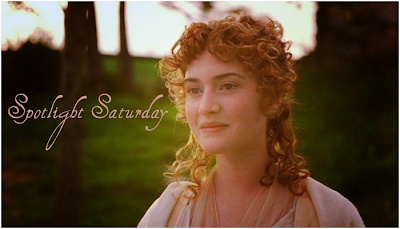
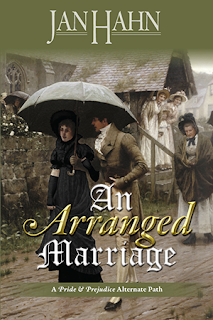
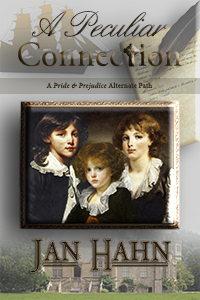 A Peculiar Connection-Amazon
A Peculiar Connection-Amazon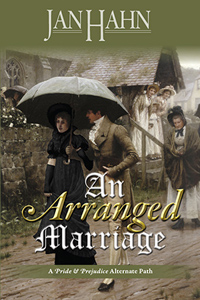 An Arranged Marriage-Amazon
An Arranged Marriage-Amazon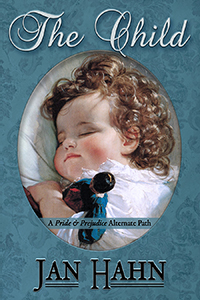 The Child-Amazon
The Child-Amazon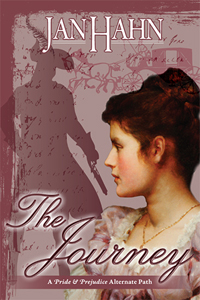 The Journey – Amazon
The Journey – Amazon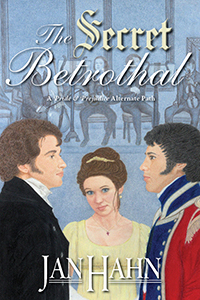 The Secret Betrothal – Amazon
The Secret Betrothal – Amazon